Graham Reid | | 9 min read
Sharon O'Neill: Smash Palace
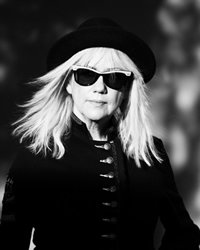
Go back and look at the newspaper and magazine articles from the late Seventies and early Eighties if you can -- and I can because I kept many shoved inside her album covers -- and see what writers and reviewers were saying about Sharon O'Neill at the time.
After her backstory had been told -- singing as a kid growing up in Nelson, with the band Chapta in Christchurch, some overseas experience, the signing with CBS New Zealand -- and the rest of the story is about money.
There's speculation on how much she'd been signed for by CBS boss John McCready, how much American producer Jay Lewis of her second album Sharon O'Neill was being paid, how much producer John Boylan of her third album Foreign Affairs was pulling down, how much she might make from her excellent album sales . . .
As our most visible female singer-songwrityer after Shona Laing, and the one who the most money was certainly being spent on, O'Neill was much written about by the women's magazines, mainstream music press like Rip It Up but also getting large spreads in the Listener (and a cover story) and Phil Gifford flew over to do a large feature on the marketing of her when she moved to Sydney in '80.
And interestingly enough in all these places she was always "Sharon" and not the more formal "O'Neill" as was the style. She was "our Sharon" and people watched her career with genuine interest because she had written great songs -- Words, Maxine, Asian Paradise, the theme to Smash Palace among them -- and was trying to break into Australia.
Eventually the money took over though. She just wasn't earning enough of it, things soured at CBS (she signed to CBS Australia so they had great faith in her too) and she couldn't record for a while. Then she did another album (for Polygram), she and her partner Alan Mansfield wrote for Dragon in which he was the keyboard player . . .
She also co-wrote with Robert Palmer and if you look back through her life you can read of trips to Japan and the US, APRA songwriting awards, television specials, opening for Leo Sayer . . .
For almost 10 years it was a quite a ride.
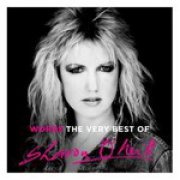 O'Neill -- our Sharon -- and still living in Sydney, has a new 20-track collection Words; The Very Best of Sharon O'Neill out through Sony (ironically the company that emerged out of CBS) and so it was time to ask her about . . .
O'Neill -- our Sharon -- and still living in Sydney, has a new 20-track collection Words; The Very Best of Sharon O'Neill out through Sony (ironically the company that emerged out of CBS) and so it was time to ask her about . . .
The money, of course.
Congratulations on the album, it's a reminder to some how great your songs were and also an introduction to your work for others. Are there some songs on it you are especially pleased to have back in the public ear that got lost for you?
I hadn't heard Power for a long time, and Anytime You Want. They've been off the radar for me for a while, and it was nice to have Smash Palace included because even I don't have that on CD.
Smash Palace was just an EP when it came out.
Yeah, it didn't have any of the incidental film music and I think it had just five songs on it.
Of course these songs have that Eighties sound people of advanced years often deride, but that sound is around now so this album fits back into a new context.
Yes, and a lot of people are going back to vinyl so it slots into that vinyl vibe and the 80s soundtrack.
I used to keep articles inside the sleeves of records and when I look back I have articles from the Listener, Woman's Weekly and various Australian magazines. Everyone was talking about the money because it was so rare for an artist to have a record company spend that much on them, That must have put intense pressure on you?
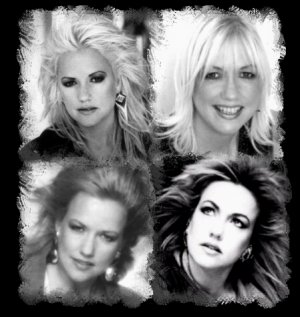 It's funny what gets to the press and
what doesn't. What gets in is you've been signed to a deal for X
amount and people think, 'Wow that's amazing, she must be loaded'.
What they don't realise is that's only an advance and you have to
work that off. If your songs don't work it off you are constantly in
debt to the record company. Where you derived your income was live
performance and from APRA as a songwriter. But if you are not selling
records you are indebted.
It's funny what gets to the press and
what doesn't. What gets in is you've been signed to a deal for X
amount and people think, 'Wow that's amazing, she must be loaded'.
What they don't realise is that's only an advance and you have to
work that off. If your songs don't work it off you are constantly in
debt to the record company. Where you derived your income was live
performance and from APRA as a songwriter. But if you are not selling
records you are indebted.
Gordon Campbell in The Listener at the time said you and the band were constantly living on a promise which receded into the future. Were you aware that it was becoming harder and harder to recoup that advance despite the very good album sales?
Yes, and I think it still is, and back then live performances were abundant, far more so than now. So consequently the record company constantly worked you, like if there was somebody you had to open for or a tour, you had to be around to work that record. Which is part of the whole deal, but you were constantly trying to work it all off.
In all the articles were “Sharon”. You were "our Sharon” did that put pressure on, the hopes of a small nation riding on your back?
(laughs) Well it is so different now. Back then the producer of Foreign Affairs John Boylan had this thing that you have to think globally. Which is all very well but when you are way down here and trying to think globally it's difficult unless you are traveling. Now with the internet you are global from your living room. But in those days he would say, 'Don't think small'. I found that hard to get my head around.
In hindsight, of course, he was ahead of things because now you have a vehicle and it's all there for you.
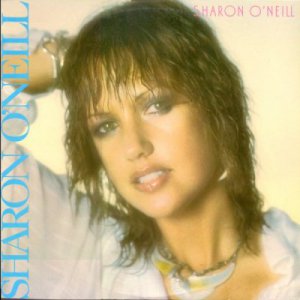 Also I notice how few reference points
writers had for a woman singer-songwriters then. The name “Linda
Ronstadt” came up repeatedly. Did you feel you were out on your
own?
Also I notice how few reference points
writers had for a woman singer-songwriters then. The name “Linda
Ronstadt” came up repeatedly. Did you feel you were out on your
own?
To be honest, I came in off the back of Shona Laing's success. I was a big fan because she got to number one with 1905 and she wrote it herself. I just though 'My God, that's fantastic' and then John McReady from CBS was interested in that I wrote my own material and that was a door that opened.
Back then apart from Carole King and a few huge ones, and a few under the surface, there were not a lot of singer-songwriters. Nowadays if you don't write you become a product of a record company but if you write it's a personal thing. And it's a challenge and a great vehicle to have.
By the time you got your contract and were in McCready's office with a pen in your hand, you were quite a seasoned performer. Were you as assured and confident as you appeared to the rest of us?
Not at all. I joined Chapta in Christchurch but you could disappear into the smoke of the pub or club you were playing at. But when I stepped out on my own I was really scared. Being basically a shy person, it was a long road. Even though I toured a lot and stepped out in television shows, it was hard. I think [the television programme] Ready to Roll helped a lot because in those days we did our own backing tracks but when you performed you were miming, so you could relax a bit.
So I did a lot, but it has not been an easy one to overcome. The basic nerves that you are out there and all alone. That's why I am very much a band singer because I love that camaraderie and that unification you get on stage with a band. Being a musician myself I like to get really involved and that helps, because I don't feel I am stepping out with a band that's reading chart I have no affiliation with. I like to have a rehearsed band which gives me the support and confidence, and that's the ticket to me.
Did you consider yourself as a songwriter who went out and performed her own songs, but first and foremost you were A Songwriter.
In the early days no, because although I wrote a lot of poetry and then put music to it – guitar or piano – really I was more of a back-up singer. We had a trio in Nelson and my girlfriend Nancy always did the lead. I was almost most comfortable doing the harmonies. I loved doing harmonies. So for me to turn it round and do the lead was quite an issue. Then I used to get bossy and make people do the harmonies I wanted to do but couldn't because I was singing the song.
I think I'm comfortable now, after all these years it's finally coming into place. (laughs)
I was in the hotel last night and saw the television ad for the album come on and I thought, 'Holy Hell, I'm in my 60s now and I finally get TV advertised!' It was wonderful.
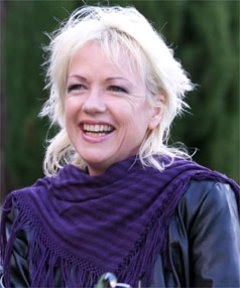 You are still writing?
You are still writing?
Yes, but not prolifically. My partner Alan and I are working on an EP idea at the moment with some of the songs we have at the moment, some need to be finished. We collaborate together as writers so it would be nice to put something out that represents songs we've written together. But that's on the back-burner for the moment but hopefully not for too long.
Nothing stops me writing, not even when the whole CBS fiasco happened. The one thing that kept me sane is knowing the one thing they couldn't interfere with was that I could sit down at the piano and write something that really meant something to me. It took my mind off all the crap.
I've always thought record companies shouldn't mess with songwriters because songwriters have the vehicle right at their fingertips to pay back. You can write about it.
Believe me in one of the tracks on the CD I'd done that.
Oh yes, I know that.
Thanks for noticing. (laughs)
Words is a wonderful song and I wonder if that was your credo when you were young, that sense of self-belief?
Not really, it was bizarre imagery I had of things spilling out of my head through my fingers and onto the piano, hence the breath away. It wasn't cathartic or anything, just a statement about how I felt about becoming a songwriter, and one who would get recorded.
That must felt like, 'This is my moment'?
Yes, you do feel like you are baring your soul about your life, or somebody else's . . . because quite often it's not about me but something a friend is going through and I can relate to, it creates something that triggers creativity in me.
I know you and Alan wrote for Dragon. Are you both diligent writers or do the song ideas come and go?
They come and go but when it comes to really completing an arrangement you have to be quite focused in that area and you have to go where the songs should reach, and die down where it should. That's the arrangement part. We have round table discussions about lyrics and sometimes it all comes from the title and it's easy. At other times you have to work at it to make it all sound sensible, but keep it pleasurable.
So your life goes on but suddenly Sony – of all people – come and say they want to put out a Very Best Of compilation. When did the process start for you?
That would have been towards the end of last year and by the beginning of the year we were able to sit with Scott Morrison in Auckland here and go into more detail and a release date. Via e-mail we discussed what would go on and what wouldn't make it. And all the blurb in the picture inner sleeve.
I love the photo of your mum and dad with the record player.
Yeah I could cry.
It feels very personal, and you were happy with all the song choices?
Ye sI am. It's interesting to see [Don't Let Love Go] with Jon Stevens in there.
Anytime You Want? Is that the most recent?
No, I think it came from the original Sharon O'Neill album but I love it because it's got those country roots. It has that crossover country vibe and I've always been a fan of that.
That's where much of the best songwriting is being done these days because those songs tell stories.
Absolutely, amazing songs coming out, storytelling and humour.
Not a lot of humour in pop music these days. People take themselves very seriously.
Yes, it can be very dark and wrist-slashing.
You and I are of an age where we don't take ourselves so seriously because we know better than to do that?
That's exactly right. Alan has a student who is about 16 and wants to write. She brings over these songs that we would otherwise never hear, but it's all so depressing. I guess she's at that age where she's taking on the world. But it cracks me up actually.
So it's not exactly having the desired effect on you.
No, absolutely not. It's hilarious. The darker and gloomier the better.
For a 2009 interview/profile of Sharon O'Neill which covers her earlier career in more detail go here.

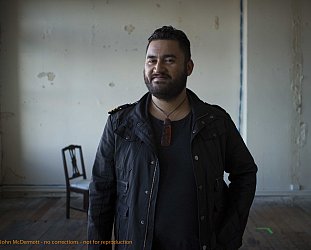


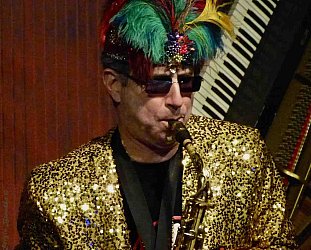

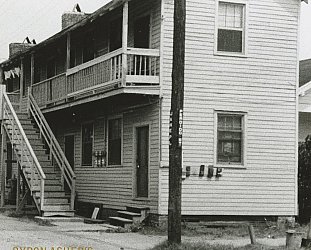
Relic - Apr 28, 2014
Many musos have lamented the industry monkey on their backs and there are so many ‘second time arounds’ possible in the digital era.
SaveBut happily sometimes things are just as they seemed–AK 79 and now this from Sharon O’Neill, still great emotive songs of the genre, Sharon is not quite a kiwi Jackie De Shannon but close.
Where Else? - Apr 29, 2014
"Maxine" is a great song. It's always been a favourite of mine.
SaveIt's good the way a lot of the old NZ stuff is being re-released. And I'm glad "The Very Best of Sharon O'Neill" is on CD and not just vinyl only like some of Flying Nun's recent releases (eg the "Dunedin Double"). Hopefully the "Dunedin Double" will be released on CD in due course.
I'm still waiting for Graeme Gash's "Watching Television" to appear on a CD...
post a comment